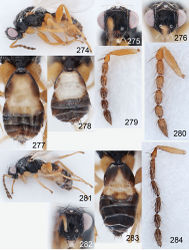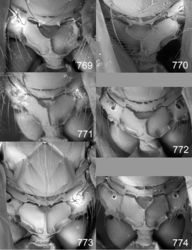Euplectrus ninazitaniae
| Notice: | This page is derived from the original publication listed below, whose author(s) should always be credited. Further contributors may edit and improve the content of this page and, consequently, need to be credited as well (see page history). Any assessment of factual correctness requires a careful review of the original article as well as of subsequent contributions.
If you are uncertain whether your planned contribution is correct or not, we suggest that you use the associated discussion page instead of editing the page directly. This page should be cited as follows (rationale):
Citation formats to copy and paste
BibTeX: @article{Hansson2015ZooKeys, RIS/ Endnote: TY - JOUR Wikipedia/ Citizendium: <ref name="Hansson2015ZooKeys">{{Citation See also the citation download page at the journal. |
Ordo: Hymenoptera
Familia: Eulophidae
Genus: Euplectrus
Name
Euplectrus ninazitaniae Hansson sp. n. – Wikispecies link – ZooBank link – Pensoft Profile
Material
Holotype a female labeled “COSTA RICA: Guanacaste, ACG, Sector Pitilla, Sendero Cuestona, 8.ii.2004, M. Rios, ex Antapistis Poole10 eating Anthurium consobrinum, sibling of wasp DHJPAR0028735, 04-SRNP-30603” (BMNH). PARATYPES: 3♀ with same label data as holotype (BMNH, INBio).
Diagnosis
Lower face black (Fig. 282); antenna long and slender (Fig. 284), flagellum 3.3× as long as height of eye; mandibles dark brown; dorsellum anteromedially with two large foveae (Fig. 774); legs yellowish-brown with fore and mid coxae yellowish-white (Fig. 281); petiole 1.0× as long as wide; gaster dark brown, anterior ½ with a large yellowish-brown T-shaped spot and with base of T pointed (Fig. 283).
Description
Female. Length of body 3.1 mm. Antenna long and slender (Fig. 284), flagellum 3.3× as long as height of eye; scape yellowish-white with apex yellowish-brown, pedicel yellowish-brown, flagellum dark brown. Mandibles dark brown, palpi yellowish-white. Head including lower face black and shiny (Fig. 282). Frons close to eyes with one row of setae (Fig. 288). Vertex smooth (Fig. 289). Occipital margin rounded (Fig. 289).
Mesosoma black and shiny (Fig. 281). Each sidelobe of mesoscutum with seven setae. Scutellum 0.9× as long as wide; with weak engraved reticulation (Fig. 290). Dorsellum anteromedially with two large foveae (Fig. 774). Propodeum smooth (Fig. 774); anteromedially with a triangular cup; propodeal callus with seven setae. Legs yellowish-brown with fore and mid coxae yellowish-white (Fig. 281). Fore wing: costal cell with two rows of setae on ventral surface, and margin with eight setae close to marginal vein; with 14 admarginal setae, in one row.
Gaster dark brown, anterior ½ with a large yellowish-brown T-shaped spot and with base of T pointed (Fig. 283).
Ratios. HE/MS/WM = 1.9/1.0/1.3; POL/OOL/POO = 4.4/2.7/1.0; OOL/DO = 1.0; WE/WF/WH/HH = 1.0/2.2/4.4/3.2; WH/WT = 1.0; PM/ST = 1.7; TS1/TS2/LT/LT1/LT2/LT3/LT4 = 3.6/2.2/5.8/1.6/1.4/1.0/1.8; LP/WP = 1.0; MM/LG = 1.2.
Male. Unknown.
Hosts and biology
Feeding on last instar larva of Antapistis Poole10 (Erebidae) feeding on Anthurium consobrinum (Araceae), parasitoid cocoons stuck to dead larva and substrate.
Distribution
Costa Rica (Guanacaste Province).
Etymology
This species is named after Nina M. Zitani, in recognition of her contribution to the understanding of ACG Hymenoptera taxonomy.
Original Description
- Hansson, C; Smith, M; Janzen, D; Hallwachs, W; 2015: Integrative taxonomy of New World Euplectrus Westwood (Hymenoptera, Eulophidae), with focus on 55 new species from Area de Conservación Guanacaste, northwestern Costa Rica ZooKeys, (485): 1-236. doi
Images
|


